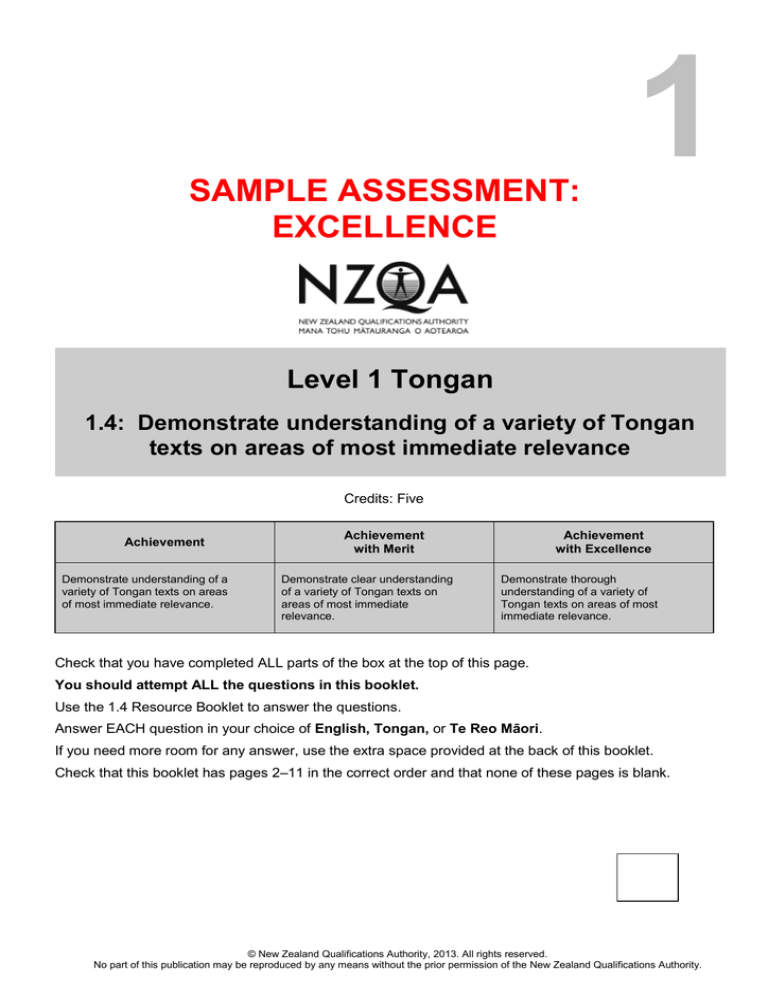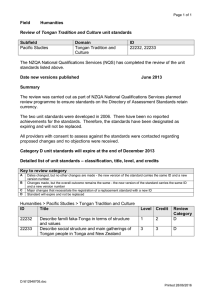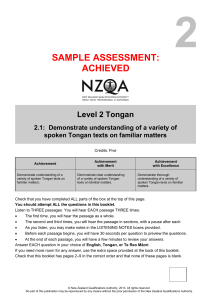
SAMPLE ASSESSMENT:
EXCELLENCE
1
Level 1 Tongan
1.4: Demonstrate understanding of a variety of Tongan
texts on areas of most immediate relevance
Credits: Five
Achievement
Demonstrate understanding of a
variety of Tongan texts on areas
of most immediate relevance.
Achievement
with Merit
Demonstrate clear understanding
of a variety of Tongan texts on
areas of most immediate
relevance.
Achievement
with Excellence
Demonstrate thorough
understanding of a variety of
Tongan texts on areas of most
immediate relevance.
Check that you have completed ALL parts of the box at the top of this page.
You should attempt ALL the questions in this booklet.
Use the 1.4 Resource Booklet to answer the questions.
Answer EACH question in your choice of English, Tongan, or Te Reo Māori.
If you need more room for any answer, use the extra space provided at the back of this booklet.
Check that this booklet has pages 2–11 in the correct order and that none of these pages is blank.
© New Zealand Qualifications Authority, 2013. All rights reserved.
No part of this publication may be reproduced by any means without the prior permission of the New Zealand Qualifications Authority.
2
Ngāue‘aki ‘a e houa ‘e taha ke tali ‘a e ngaahi fehu‘i ‘i he pepa ni.
You are advised to spend one hour answering the questions in this booklet.
FIRST TEXT: Ko e feohi fakalata atu
Lau ‘a e talanoa ‘uluaki mei he peesi 2 ‘o e pepa talanoa pea tali ‘a e Fehu‘i ‘Uluaki.
Read the text on page 2 of the resource booklet. Use it to answer Question One.
FEHU‘I ‘ULUAKI – QUESTION ONE
(a)
Talamai ha fakalata ‘e ua ‘o e fetaulaki ‘a e ngaahi kaungāme‘a.
Give two reasons why these friends enjoyed their get together.
‘Uhinga 1 / Reason 1
Meeting as friends after not seeing each other for a while.
‘Uhinga 2 / Reason 2
Sharing of different individual stories about what they have been through at their
prospective schools.
(b)
Ko e hā ha ‘uhinga ‘e ua na‘e makehe ai ‘a e polo fakaako ‘a Mele he ta‘u ni?
What were two of the highlights at Mele’s school ball this year?
Fakatātā 1 / Example 1
Ana was finally allowed to come to the school ball with a partner.
Fakatātā 2 / Example 2
Ana’s parents paid for a stretch limo to bring Ana and her partner to the school ball.
(c)
Ko e hā ne kaaimu‘a hake ai ‘a Paula ‘oku te‘eki ai ke ‘osi e talanoa ‘a Mele?
Why did Paula interrupt Mele’s story?
He was afraid to wait in case he didn’t have enough time to share his story.
Tongan 1.4 Sample assessment: Excellence
Ke
ngāue‘aki
pē ‘e he
fai sivi
Assessor’s
use only
3
(d)
Ko e hā ne vetengata‘a ai ‘enau talanoa? ‘Omai ha ‘uhinga ‘e tolu ‘o fakatatau ki ho‘o ‘ilo‘i
e talanoa.
In your opinion, why was it so difficult for the friends to stop their conversation? Give three
reasons to support your answer.
‘Uhinga 1 / Reason 1
They lacked the time to share individual stories.
‘Uhinga 2 / Reason 2
They have a lot to share in so short a time.
‘Uhinga 3 / Reason 3
Coming from different schools means they can meet only once a week before the games.
Tongan 1.4: Sample assessment: Excellence
Ke
ngāue‘aki
pē ‘e he
fai sivi
Assessor’s
use only
4
SECOND TEXT: Ko e faiva faka-Tonga
Vakai ki he fakatātā ‘i he peesi 3 pea ngāue‘aki ia ke tali ‘a e Fehu‘i Ua.
Look at the image on page 3 of the resource booklet. Use it to answer Question Two.
FEHU‘I UA – QUESTION TWO
(a)
Talamai ha me‘a ‘e tolu ‘oku ke sai‘ia ai ‘i he fakatātā ko ‘eni.
List three reasons why you like this picture.
‘Uhinga 1 / Reason 1
The different levels of performance show the individual uniqueness.
‘Uhinga 2 / Reason 2
I like the way culture is portrayed in the way the students are dressed for the
performance.
‘Uhinga 3 / Reason 3
The performers’ facial expressions reflect happiness and their willingness to be
identified as Tongans.
(b)
Ko e hā ha me‘a ‘e tolu mei he fakatātaa ‘oku ne talamai hotau anga faka-Tonga.
Name three things you can see in the picture that tell you about Tongan culture.
Fakatātā 1 / Example 1
Community effort. For example, parents supporting their children.
Fakatātā 2 / Example 2
The wearing of appropriate dancing costumes reflects our identity.
Fakatātā 3 / Example 3
The beauty of Tongan dance is in the gracefulness of the performers.
Tongan 1.4: Sample assessment: Excellence
Ke
ngāue‘aki
pē ‘e he
fai sivi
Assessor’s
use only
5
(c)
Talamai ha ‘ulungaanga lelei ‘e tolu ‘oku ke fakatokanga‘i mei he fakatātaa.
Give three moral lessons you can learn from the picture.
Lēsoni 1 / Lesson 1
Happiness is the key to success.
Lēsoni 2 / Lesson 2
Teamwork makes life easier.
Lēsoni 3 / Lesoni 3
Life is sharing and supporting one another.
(d)
Ko e hā ‘oku mahu‘inga ai ‘a e kau mai ‘a e mātu‘a he ngaahi faiva fakaako?
Why is it important for parents to be part of Secondary Schools ASB Polyfest?
It is important for parents to be a part of the Secondary Schools ASB Polyfest
because learning takes place when parents provide the support that schools require.
They should work as partners with the school.
Tongan 1.4: Sample assessment: Excellence
Ke
ngāue‘aki
pē ‘e he
fai sivi
Assessor’s
use only
6
THIRD TEXT: Ko hoku fāmili
Lau ke mahino ‘a e tohi hohoko fakafāmili ‘i he peesi 4 ‘o e pepa talanoa pea ke ngāue‘aki ia ke
tali ‘a e Fehu‘i Tolu.
Study the family tree on page 4 of the resource booklet. Use it to answer Question Three.
FEHU‘I TOLU – QUESTION THREE
(a)
Na‘e toko fiha ‘a e fanga makapuna ‘uluaki ‘o Mele?
How many first grandchildren did Mele have?
Mele had five grandchildren.
(b)
Ko hai he tama ‘a Mele na‘e ‘ikai hano hako?
Who did not have any children?
Sioeli did not have any children.
(c)
Talamai ange ha ‘uhinga ‘e ua ki he ‘ikai ha hako ‘o e taha he fānau ‘a Mele?
Why was it that one of Mele’s children did not have any children?
‘Uhinga 1 / Reason 1
He never married.
‘Uhinga 2 / Reason 2
He died at a young age.
Tongan 1.4: Sample assessment: Excellence
Ke
ngāue‘aki
pē ‘e he
fai sivi
Assessor’s
use only
7
(d)
Tā ha fakatātā ‘o e hokohoko homou fāmili. Kamata mei ho‘o kui ‘o ha‘u ai ki ho‘o mātu‘a
pea a‘u mai kia koe. ‘Oku ‘atā pē ke ke fakakau mai ai ho‘o ngaahi fa‘ētangata mo
mehekitanga.
Draw your own family tree. Include your parents and siblings (brothers and sisters). You may
also include grandparents and cousins, depending on the size of your family.
(Individual family tree diagram here.)
Tongan 1.4: Sample assessment: Excellence
Ke
ngāue‘aki
pē ‘e he
fai sivi
Assessor’s
use only
8
FOURTH TEXT: Fakalakalaka ‘o e tekinolosia
Sio ki he ngaahi fakatātā ‘i he peesi 5 ‘o e pepa talanoa. Ngāue‘aki ia ke tali ‘a e Fehu‘i Faa.
Look at the images on page 5 of the resource booklet. Use them to answer Question Four.
FEHU‘I FĀ – QUESTION FOUR
(a)
Talamai ha ngaahi me‘a ‘e tolu he fakatātaa ‘oku tokoni ke vave ange ai ‘a e fetu‘utaki.
Name three things from the photos that improve communication.
Fakatātā 1 / Example 1
Landline phone.
Fakatātā 2 / Example 2
Cell phones.
Fakatātā 3 / Example 3
Using computers.
(b)
Ko e hā ha tokoni ‘e ua ‘a e ngaahi tekinolosia ko ‘eni ke toe vāofi ange ai ‘etau fetu‘utaki
mo hotau ngaahi fāmili?
What are two of the advantages of having new technology when it comes to communicating
with our families?
‘Uhinga 1 / Reason 1
New technology costs less, for example email.
‘Uhinga 2 / Reason 2
It is easier to access.
Tongan 1.4: Sample assessment: Excellence
Ke
ngāue‘aki
pē ‘e he
fai sivi
Assessor’s
use only
9
(c)
Ko e hā ha palopalema ‘oku fakatupu ‘e he ngaahi tekinolosia ko ‘eni?
What are some of the problems that new technology brings?
Ako / Study
It creates huge distractions for students.
Fāmili / Family
It causes a lot of family problems, for example financially.
Siaisi / Church
It costs churches more money to buy up-to-date technology.
(d)
Fili mai ha taha mei he ngaahi fakatātaa ni ‘oku ke pehē ‘oku pau mo malu taha ke
ngāue‘aki ‘e ho fāmili. Talamai ha ‘uhinga ‘e tolu ki ho‘o fili.
Select what you consider to be the best means of communication from text 4.
Cell phone.
Give three reasons why you think it is the best kind for you and your family.
Fakatātā 1 / Example 1
Easy to take with you everywhere you go and can store numbers for further use
Fakatātā 2 / Example 2
Can use it to call other family members.
Fakatātā 3 / Example 3
Can use certain monthly plans for family members at a much cheaper rate.
Tongan 1.4: Sample assessment: Excellence
Ke
ngāue‘aki
pē ‘e he
fai sivi
Assessor’s
use only
10
Konga ‘oku ‘atā ‘o ka fiema‘u.
Extra space if required.
Tohi ‘a e fika ‘o e fehu‘i ‘o ka fiema‘u.
Write the question number(s) if applicable.
Fika ‘o e
fehu‘i
Question
number
Tongan 1.4: Sample assessment: Excellence
Ke
ngāue‘aki
pē ‘e he
fai sivi
Assessor’s
use only
11
Konga ‘oku ‘atā ‘o ka fiema‘u.
Extra space if required.
Tohi ‘a e fika ‘o e fehu‘i ‘o ka fiema‘u.
Write the question number(s) if applicable.
Fika ‘o e
fehu‘i
Question
number
Tongan 1.4: Sample assessment: Excellence
Ke
ngāue‘aki
pē ‘e he
fai sivi
Assessor’s
use only






